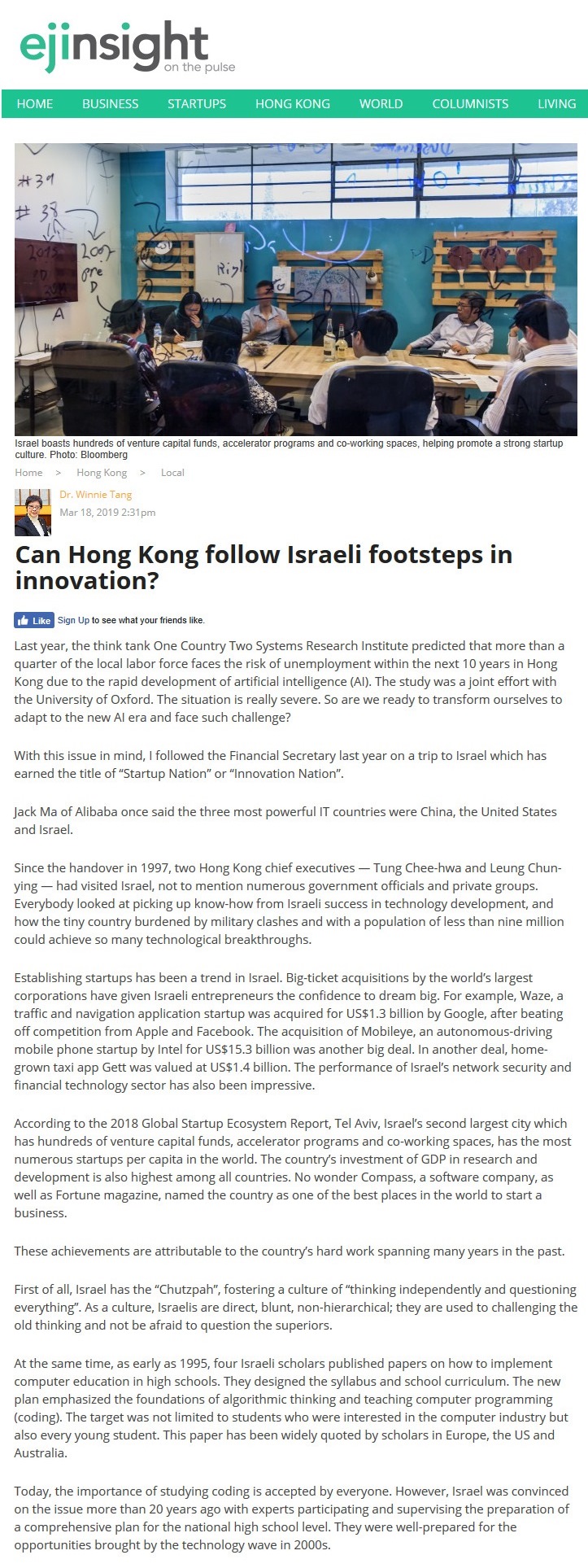上版請按此

Can Hong Kong follow Israeli footsteps in innovation?
Last year, the think tank One Country Two Systems Research Institute predicted that more than a quarter of the local labor force faces the risk of unemployment within the next 10 years in Hong Kong due to the rapid development of artificial intelligence (AI). The study was a joint effort with the University of Oxford. The situation is really severe. So are we ready to transform ourselves to adapt to the new AI era and face such challenge?
With this issue in mind, I followed the Financial Secretary last year on a trip to Israel which has earned the title of "Startup Nation" or "Innovation Nation".
Jack Ma of Alibaba once said the three most powerful IT countries were China, the United States and Israel.
Since the handover in 1997, two Hong Kong chief executives — Tung Chee-hwa and Leung Chun-ying — had visited Israel, not to mention numerous government officials and private groups. Everybody looked at picking up know-how from Israeli success in technology development, and how the tiny country burdened by military clashes and with a population of less than nine million could achieve so many technological breakthroughs.
Establishing startups has been a trend in Israel. Big-ticket acquisitions by the world's largest corporations have given Israeli entrepreneurs the confidence to dream big. For example, Waze, a traffic and navigation application startup was acquired for US$1.3 billion by Google, after beating off competition from Apple and Facebook. The acquisition of Mobileye, an autonomous-driving mobile phone startup by Intel for US$15.3 billion was another big deal. In another deal, home-grown taxi app Gett was valued at US$1.4 billion. The performance of Israel's network security and financial technology sector has also been impressive.
According to the 2018 Global Startup Ecosystem Report, Tel Aviv, Israel's second largest city which has hundreds of venture capital funds, accelerator programs and co-working spaces, has the most numerous startups per capita in the world. The country's investment of GDP in research and development is also highest among all countries. No wonder Compass, a software company, as well as Fortune magazine, named the country as one of the best places in the world to start a business.
These achievements are attributable to the country's hard work spanning many years in the past.
First of all, Israel has the "Chutzpah", fostering a culture of "thinking independently and questioning everything". As a culture, Israelis are direct, blunt, non-hierarchical; they are used to challenging the old thinking and not be afraid to question the superiors.
At the same time, as early as 1995, four Israeli scholars published papers on how to implement computer education in high schools. They designed the syllabus and school curriculum. The new plan emphasized the foundations of algorithmic thinking and teaching computer programming (coding). The target was not limited to students who were interested in the computer industry but also every young student. This paper has been widely quoted by scholars in Europe, the US and Australia.
Today, the importance of studying coding is accepted by everyone. However, Israel was convinced on the issue more than 20 years ago with experts participating and supervising the preparation of a comprehensive plan for the national high school level. They were well-prepared for the opportunities brought by the technology wave in 2000s.
Dr. Winnie Tang
Adjunct Professor, Department of Computer Science, Faculty of Engineering and Faculty of Architecture, The University of Hong Kong